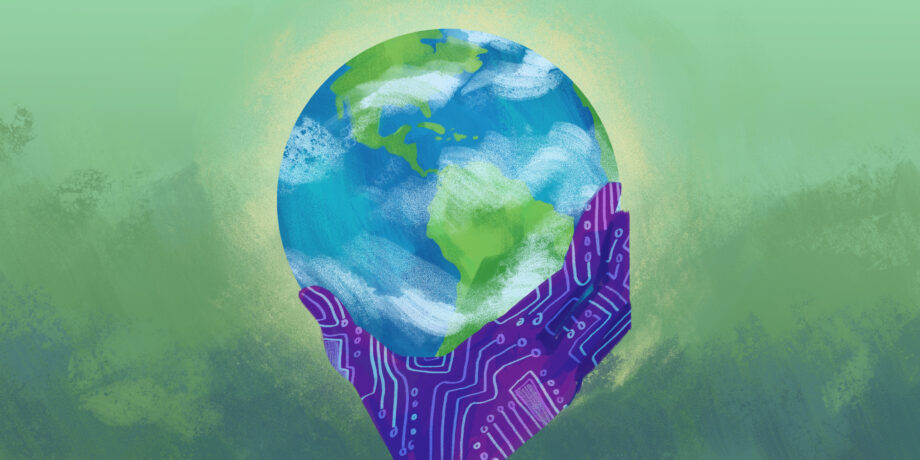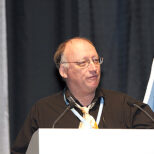Guest blog: The Next Eight Years Will Make All Of The Difference
OPINION: THE NEXT EIGHT YEARS WILL MAKE ALL OF THE DIFFERENCE
 Illustration by Kelsey King
Illustration by Kelsey KingApril 5, 2022 — “Yesterday is not ours to recover, but tomorrow is ours to win or lose.” –Lyndon B. Johnson, 1963
If New Years’ resolutions bring hope and challenge, new decade resolutions do even more so. And perhaps never more than those humanity has set for 2030.
That is the year by which governments around the world have agreed to address societies’ biggest challenges by delivering on the 2030 Agenda for Sustainable Development, which includes the 17 Sustainable Development Goals (SDGs). By 2030, we will know if the Paris Climate Agreement can keep the rise in global temperature below 1.5 °C (2.7 °F) over pre-industrial time. We’ll also likely know whether it will be possible to be carbon neutral by 2050.
At the same time we work toward these goals, we find ourselves in the throes of the Fourth Industrial Revolution, with disruptive change in the areas of artificial intelligence (AI), Big Data and analytics, biotechnology, augmented reality and virtual reality, the Internet of Things (IOT), blockchain, self-driving transportation, quantum computing, and energy.
As U.S. President Joe Biden said in his 2021 address to a joint session of Congress, “We’ll see more technological change in the next 10 years than we saw in the last 50.”
The Question Today
The question for us today — right now, in 2022 — is whether we will harness these innovations to achieve those goals or squander the opportunities they offer.
Between now and 2030, AI will make our homes smarter and IoT will give us new ways to control appliances. Will we use these simply to become more entertained and less capable of doing things ourselves? Or will we apply them to boost energy efficiency, reduce food waste, stay healthy and help people with physical limitations lead more fulfilling lives?
By 2030, driverless cars will be more common and short-haul flights might be on electric planes. Will we just drive and fly all that much more, or will we take advantage of the opportunity these technologies offer to reduce fossil fuel use and transition to a clean energy economy?
Disruptive technological change is upon us, and our job is not to ignore it but to proactively steer it toward positive ends.
Globalization, demographic changes, and the adoption of technologies are significantly redefining the workplace and present many challenges. The skills and jobs of 2030 will be very different than the ones we have in 2022. We may see jobs like personal data brokers, classroom avatar managers, body part makers and garbage designers. Disruption will have huge impacts on certain industries — oil and gas use will massively decline. Over half and perhaps as much as 70% of the U.S. workforce could be freelancing. Will these changes just make us busier than ever — or will we use them to reduce our planetary footprint and strengthen families and communities?
AI and other technologies could revolutionize our educational systems as well. Will robot teachers enhance our ability to tailor learning to individuals and provide access to the work of the best thinkers and scientists? Could virtual reality help reduce racism through empathetic experiences? Will augmented reality enhance empathy by facilitating virtual field trips to faraway places and cultures?
Toward Positive Ends
In the large arc of history, the next eight years may not seem long. But we are in a time of massive progress that will bring social change at a speed we have never had to deal with before.
Generally, people do not like change; we want stability. But disruptive technological change is upon us, and our job is not to ignore it but to proactively steer it toward positive ends.
Rather than fearing emerging technologies, we can actively engage with them in order to ensure they are used to contribute to the common good.
We can commit to applying them in our own lives to advance sustainability, equity and justice, from reducing food waste and the use of fossil fuels to enhancing participation in governance.
We can help steer them toward societal good and away from harm by advocating for smart laws and regulations that take into account unintended as well as intended consequences.
We can use them to reduce racism and other forms of discrimination by enhancing empathy through virtual experiences.
We can advocate for applying them equitably across developed and emerging economies so as to avoid further exacerbating the divide between “haves” and “have-nots.”
The decision in 2015 to adopt the Sustainable Development Goals and targets and the Paris Climate Agreement gave us the road map to building better societies and reducing greenhouse gases in the atmosphere. Today’s technological revolution offers us the right foundation to build upon. Only time will tell if at last we’ll get it right.
Felix Dodds, Carolina Duque Chopitea and Ranger Ruffins are authors of Tomorrow’s People and New Technology: Changing How We Live Our Lives, published in 2021 by Routledge.






Comments
Post a Comment